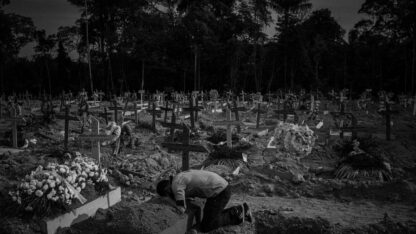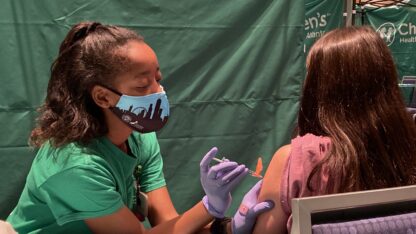State officials say they will send a National Guard medical support team to help an Albany hospital deal with its deluge of COVID-19 patients.
That will help the already stretched medical staff deal with the constant flow of area residents with symptoms of coronavirus. “Patients keep coming every day,’’ said Phoebe Putney Memorial Hospital spokesman Ben Roberts. “Our critical care staff is reaching their maximum capacity.’’
Phoebe Putney Memorial Hospital on Thursday reported its death toll from coronavirus had reached 16, an increase of four in the past day.
Ryan Loke, health policy adviser for Gov. Brian Kemp, told GHN that state officials would continue to prioritize the Albany hospital for distribution of personal protective equipment (PPE), which generally is in short supply across the state and nation.
Dougherty County, where Albany is the major city, has 164 cases of COVID-19 as of 7 p.m. Thursday. It’s second in the state only to the 231 in Fulton County, which has more than 10 times the southwest Georgia county’s population.
The state reported 1643 cases of COVID-19 at 7 p.m. Thursday, with 56 deaths.
The nonprofit hospital still has 31 coronavirus patients, and another 95 suspected cases in the hospital who are waiting for test results.
“More and more of these patients are becoming critically ill,’’ Roberts said.
More than 1,000 others in the community are also awaiting lab results. The spread has been linked to two recent, heavily attended funerals in Albany.
Scott Steiner, the hospital’s CEO, said that physicians and nurses in Georgia have contacted Phoebe to volunteer there during the crisis.
Obtaining PPE continues to be a struggle for hospitals. Without proper protection – masks, gloves, gowns, face shields – doctors, nurses and other health care workers can be exposed to the virus.
That danger has shown up in Boston, where more than 150 employees across four hospitals have tested positive for the coronavirus, MassLive reported.
Loke said the federal government “is working overtime to get states the necessary supplies they need from the Strategic National Stockpile.’’
Georgia facilities’ requests for PPE go through a centralized system run by the Georgia Emergency Management Agency and Public Health “and are allotted a specific amount of their request based on greatest need,’’ Loke said.
Meanwhile, Kemp has called on Georgia businesses to help the state provide, produce, distribute or store critical health care items needed to fight the spread of COVID-19.
Emory Healthcare said Thursday it had launched a drive-through donation site as part of a larger effort to address the shortage of PPE and supplies “that are critical for front-line health care workers tackling the virus.’’
Dr. Melanie Thompson, an infectious disease specialist and founder of the AIDS Research Consortium of Atlanta, told GHN that front-line health care workers are grappling with insufficient medical supplies.
“Even though we’re there for the people beginning to have symptoms, and there’s a shortage of tests, we’re getting very little support,” Thompson said. “It’s absolutely appropriate that hospitals get first dibs on PPE.”
The specter of overwhelmed hospitals was raised by Dr. Kathleen Toomey, Georgia’s public health commissioner, while speaking Wednesday to about 500 pastors who were on a conference call with Kemp.
“We have concerns that the virus will spread at a very rapid rate and it will overwhelm hospitals,” Toomey told the pastors, according to the AJC.
Churches, Toomey said, may have been a connecting link between many COVID-19 cases in hot spots, especially in Albany, Cartersville and parts of Middle Georgia.
Many cases of COVID-19 in northwest Georgia have been linked to one gathering, said the director of the local Public Health district, according to the Rome News-Tribune.
Dr. Gary Voccio didn’t specifically mention Cartersville’s Church at Liberty Square, but many cases have been linked to a choir gathering at the church in early March, the newspaper reported. Clay Bentley, a COVID-19 patient treated at a Rome hospital and interviewed by CNN, said he believes he contracted the illness from the Cartersville church gathering. Bentley is recuperating at home.
Several long-term care facilities in Georgia have also seen outbreaks. One of Dougherty County’s overall total of at least 18 deaths came at an Albany nursing home. The number of positive tests for the coronavirus has raised fears of a possible deadly outbreak among an especially vulnerable group of people.
At Greenwood Place Marietta, an assisted-living community for seniors, three residents have tested positive for the virus. Three more are awaiting test results, as is an employee.
Enlivant, the Chicago-based company that operates Greenwood Place Marietta, told GHN that none of the seven are currently at Greenwood Place.
“We are continuing to monitor the situation and follow the guidance of health officials and authorities for responding to and preventing the spread of COVID-19,’’ a company spokesman said.
In other developments Thursday:
To deal with the demand for economic relief, Gov. Kemp signed an executive order authorizing Labor Commissioner Mark Butler to issue two emergency rules extending the length of time an individual can collect unemployment benefits from 14 weeks to 26 weeks and providing that the first $300 of wages earned in a week will not count against eligible unemployment benefits paid.
Meanwhile, Dobbins Air Reserve Base in Marietta has released all former passengers of the cruise ship the Grand Princess that it had in quarantine, according to a spokesperson from the U.S. Department of Health and Human Services. The ship was stranded off the California coast after 21 people aboard tested positive for COVID-19, and people aboard were moved to quarantine facilities earlier this month.
To get an idea of what health care workers are experiencing on the front line of the crisis, here’s a letter to the editor by a Decatur physician to Decaturish.
Max Blau contributed to this article.
This article was originally published at Georgia Health News.










